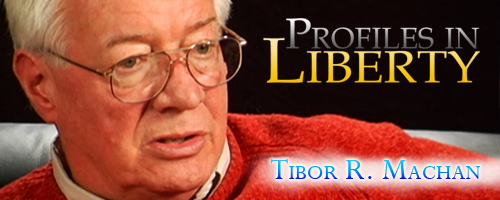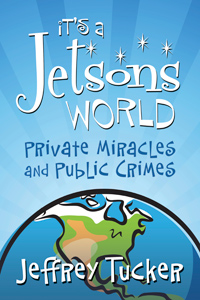Spike Lee’s Twitter Message About George Zimmerman and Causation under Libertarian Theory
(Austrian) Economics, Anti-Statism, Libertarian TheoryAs Bob Wenzel notes here:
I hate to say this about a fellow Knicks fan and author of one of my favorite books, Best Seat in the House: A Basketball Memoir, but Spike Lee did something really stupid.
He tweeted what he thought was the address of George Zimmerman, the shooter of Trayvon Martin. That’s dumb enough. Talk about rush to judgement and mob rule. But the idiot on top of everything else tweeted out the wrong address. It’s the address of an elderly couple [Elaine and David McClain] in the general vicinity of where Zimmerman lives, but have nothing to do with Zimmerman. They now live in justifiable fear.
If some third party aggressor had used the information supplied by Lee to harm the McLains, should Lee be liable under libertarian principles?
As a general matter, someone—say, A—is responsible prima facie only for his own actions, not those of others. That is, A is responsible for harm he directly causes. If someone else—say, B—directly commits aggression against victim C, then A is “vicariously” responsible for B’s tort or crime only if there is some special reason to impute B’s acts to A. (For more on Rothbard’s and my views on vicarious liability, respondeat superior, etc. see my posts Corporations and Limited Liability for Torts and Corporate Personhood, Limited Liability, and Double Taxation.)
In the case posited, Lee is at most indirectly or vicariously responsible for the acts of aggression committed by someone acting against the McLains using information from or acting on suggestions in Lee’s tweet. The basic question is: should Lee be considered vicariously responsible, along with the direct aggressor, for the direct aggressor’s crime? Can Lee be considered a cause of the harm done to the victim?
Most libertarians recognize that in some cases, A is vicariously responsible for B’s actions. For example: if A coerces B to harm C, then A is causally responsible for what happens to C. (B is responsible too, but maybe even less responsible than A.) Or, if A has a contract with B, such as a wife hiring a hit-man to kill her husband. But these are ad hoc exceptions, not grounded in any general theory of causal responsibility. Some, such as Walter Block, seem to believe that these are the only grounds for vicarious liability (see, e.g., Reply to “Against Libertarian Legalism” by Frank van Dun; also Rejoinder to Kinsella and Tinsley on Incitement, Causation, Aggression and Praxeology). Walter’s concern seems to be that a more general theory outside these two narrow exceptions would be contrary to Rothbard’s view that someone is not liable for “merely” “inciting” others to commit aggression (Rothbard, Self-Defense and “Human Rights” As Property Rights, in Ethics of Liberty).
I think this ad hoc approach is problematic. First, it is not general or clearly rooted in a general theory of causal responsibility. Second, there are problems with each of the two ad hoc exceptions. In the case of A coercing B, this would imply that, say, President Truman is not responsible for dropping nuclear weapons on Japan. Walter has argued that in such a case the higher-ups in the government always and necessarily are coercing the underlings down the chain of command. This does not seem correct. It could be correct, but as far as I know Truman didn’t actually carry a firearm. At most he could have ordered someone to coerce the general, to coerce the next down the line and so on. But he was not coercing the first guy he ordered. And so on. Further, it seems that Truman should be responsible even if he had not coerced anyone. If his commands were effective in a given hierarchical structure or organization, then he is causing the underling to perform certain actions.
And in the case of A hiring B to harm C—a contract is merely a transfer of title to property (A Libertarian Theory of Contract: Title Transfer, Binding Promises, and Inalienability). The Austrian theory of subjective value recognizes that a person B may value many things—not just money transferred by contract. He might value instead the possibility of sexual favors A might give him later. And so on. It seems odd and unAustrian to assert that A paying money to B is the only way of inducing B to do something that makes A responsible for it.
Pat Tinsley tried to sketch out a general theory of how to treat such matters in Causation and Aggression. We argue that in some cases A can be vicariously responsible for crimes committed directly by B (B is of course always liable too). We do not limit this to the two narrow cases noted above—A and B having a “contract,” or A coercing B. Our view is rooted in praxeology and its conception of action as the choice to employ certain causally efficacious means to achieve a given goal. We need to recognize that other humans can serve as means to action. In the free market, for example, hiring someone to provide a good or service is one way to achieve a desired end. But others can be employed as means to achieve illicit ends as well. For example, a mafia boss ordering someone to kill a victim; a wife hiring a hit man or seducing her lover to persuade him to murder the husband. But these are just example. They do not exhaust the general category.
Still: the default presumption is that only the direct actor (B) is liable or responsible for his torts/crimes. If you want to implicate A as well, to make him also responsible for B’s action, you have to in effect show that A has used B as his “means” to accomplish the sought-after illicit goal. A has to be more than a so-called “but-for” or factual case of the harm (e.g., Hitler’s mother is a but-for cause of the Holocaust but it is not her fault). A has to be a so-called “proximate” cause. I.e., the nature of A’s action is such that it is characterized as a use of B as a means to achieve aggression against C.
Just as in the case of what kind of menacing statements may be counted as threats, determining whether only B is liable for his actions, or whether he was also a “means” for A’s action, there is a continuum and a necessity to draw lines. As Rothbard notes in Self-Defense, the threat must be direct and overt to justify a violent response. Otherwise, you get something like George W. Bush’s doctrine of preemptive self-defense used on the Iraq War. (For a discussion of the libertarian approach to preventative force, see my Knowledge, Calculation, Conflict, and Law, p. 65.)
In my view, just as a diffuse menacing statement does not count as a threat, so making generalized statements, e.g. a opinion expressed in a book that you wished people would kill red-heads, is too far removed—not “proximate” or close enough—implicate the speaker. In the case of incitement of a lynch mob, I think the inciter actually may be liable (contra Block and Rothbard). But I think the Twitter/Lee scenario is closer to the case of publishing an opinion in a book, than to inciting a mob.
Therefore, I would say that Lee is not vicariously liable in this case, though arguably it is a close call.
(Incidentally: apparently the tweet was a violation of Twitter’s terms of service. I don’t see this as relevant. At most, Lee owes Twitter some contractual penalty damages. Or, if the positive law were to [wrongly, in my view] hold Twitter liable, maybe Lee would have to contratually indemnify them. But I don’t see this as relevant to his liability to the hypothetically victimized McLains. Also: One could also say Lee has defamed the McLains; but of course defamation law is unlibertarian. See Rothbard, Knowledge, True and False.)
So at most, Lee is implicitly expressing a desire that people harm Zimmerman (well, the McLains). It’s not even explicit. But just because you say what you would like, does not mean you are causally responsible for others doing it. Of course, I do think it’s very immoral. But not all immoral actions rise to the level of rights violations.
That said, in a free society suppose Zimmerman or the McLains came to harm—I think Lee “ought” to try to make restitution, and indeed, he may be ostracized for his role in this if he does not make amends. (And, in fact, Lee has now agreed to pay private compensation to the McLains.) So in the end, in a free society, it might not matter that he is “only” morally culpable. People in a free society where ostracism and restitution are the dominant mode of enforcing law might be more willing to “punish” non-crimes, i.e. merely immoral action, since you don’t really need to justify this “punishment” as we do with real corporal punishment, since the latter is justified only in response to a rights violation. But non-violent forms of “punishment” are justifiable in response to mere immorality. So it seems to me that in a society with mostly ostracism and restitution as an enforcement mechanism, the “law” might tend to prohibit not only aggression, but also severly immoral actions (with bad consequences) like the Lee scenario. But since the law is here per assumption not backed up by force, that result should not trouble the libertarian very much. (It is possible that a private law society would actually employ punishment in a regular or institutionalized way, but it is costly. For reasons why a restitution-based system relying on ostracism would be more likely, see Fraud, Restitution, and Retaliation: The Libertarian Approach and Knowledge, Calculation, Conflict, and Law, pp. 64-65; also The Libertarian Approach to Negligence, Tort, and Strict Liability: Wergeld and Partial Wergeld.)
On the other hand: suppose harm came to the victims, and then some relative of the victims were to attacks Lee in retaliation. It is easy to imagine a jury acquitting the relatives in their trial.



